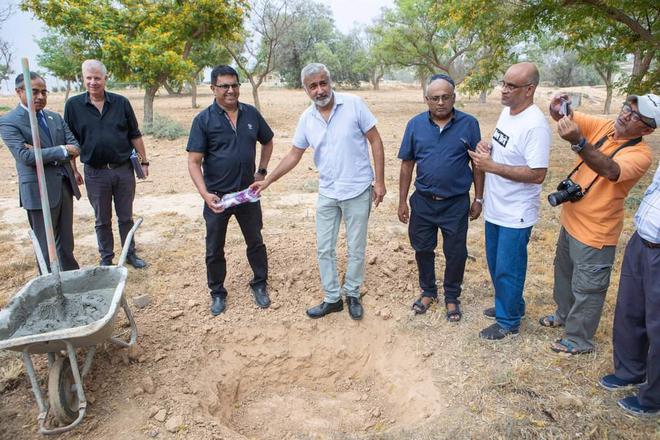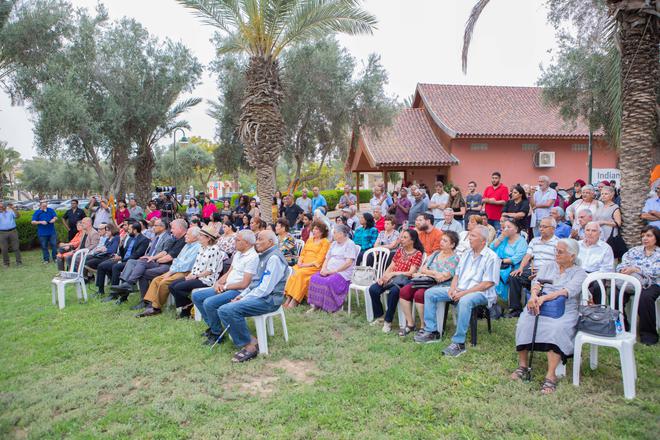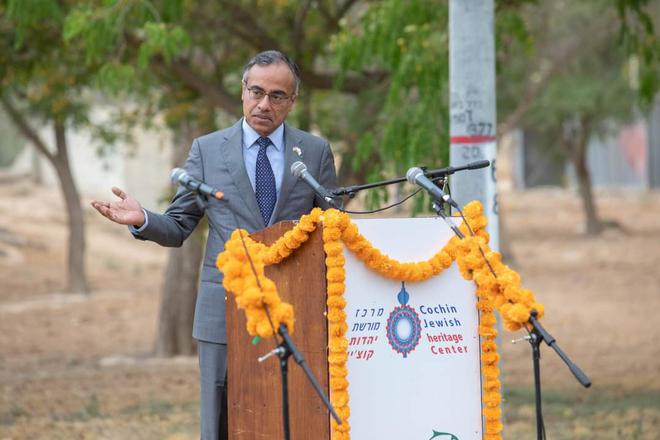The Moshav (agricultural village) of Nevatim lies in the Negev desert east of Be’er Sheba, amid scenery reminiscent more of Rajasthan than the native Cochin of its founders. On Thursday afternoon (June 8), the elders of this famous IndianIsraeli hamlet prepared for a long-awaited event that would make local history. Dressed in their best Indian finery, they decked a podium in marigolds, prepared platters of Laddu and tea, and arranged rows of chairs on the lawn for guests.

Hundreds of attendants gathered for the laying of the foundation stone for the Heritage and Cultural Center of Indian Jews, right across the lawn from the Chochin Jewish Heritage Center. The multi-million-dollar project is spread across three acres of land and will have a museum, conference and events hall, and an Indian tropical garden, encapsulated in a lotus-stem shaped complex, designed by leading Israeli architects, Tzvi Efrat and Meira Kozlovskyof the Bezalel Academy of Art and Design. The first stage of its construction will see the coming up of a 300-seat multipurpose hall, slated for completion in 2024.
Guests arrived from all four Jewish-Indian communities: Cochinis, Bnei Israel, Baghdadis and Bnei Menashe.
In turn, the Israeli-born generation of community leaders took to the podium and addressed the audience with brief speeches delivered in Hebrew, translated into English, and even Marathi. Devotional hymns were sung in all four respective traditions, in Hebrew, English, Malayalam, and Kuki.
Jews in India
The origins of Jewish presence in India are debated among historians, but they go back almost 2,000 years, at least. In 1968, Cochini Jews celebrated celebrated 2000-year anniversary to the community. There are currently 80,000-95,000 Jews of Indian descent living in Israel.
One reason this event is historic was the joyous participation of all four Jewish-Indian communities. The festivities symbolised not only the rise of Israel-India relations, but also internal reconciliation among Indian Jews, where internal feuding and communal acrimony along the lines of caste and class go back hundreds of years.

In 1520, a letter was sent to Cairo, to Rabbi David ben Zimrah, one of the leading authorities of the day on Jewish law, to adjudicate a dispute between the two factions of Cochini Jews — Malabaris and Paradesis, otherwise known as Black Jews and White Jews. The former claimed the latter were not local Jews, but immigrants from European Jewry, and therefore not entitled to their upper-caste privileges granted by the Maharaja of Malabar. The latter group, who penned the letter, claimed that the Black Jews were not of pure Jewish pedigree and were descendants of mixed marriages with local Hindus. Rabbi Ben Zimrah outlined a plan to restore the peace, but it was not implemented.
The community later experienced friction around the status of children of the Paredesis from mixed marriages. Their full integration into the community arrived only in 1942 after a long campaign of protests by Abraham Barak Salem, inspired by Mahatma Gandhi’s campaign for the Untouchables.
Baghdadi Jews were primarily upper-class merchants, a vital part of British Raj commerce networks. They remained largely aloof of Bnei Israel Jews, who had OBC status, even though they resided in the same trading hubs, stretching from Karachi to Mumbai, Pune, and Kolkata.

The Bnei Menashe hail from Kuki tribal regions of Mizoram and Manipur. They view themselves as one of the Ten Lost Tribes of Israel, Menashe. They are newcomers into the fold of Judaism, becoming practicing Jews only in recent decades. The Israeli Chief Rabbinate demands they undergo formal conversion to Judaism before immigrating to Israel, under the Israeli “Law of Return” repatriation act.
Thursday’s event championed all-Indian Israeli brotherhood. The Heritage Center will showcase all four communities, stressing their successful integration into Israeli society and the distinctly Indian flavor that they contribute to the Israeli melting pot.
‘Living bridge’
President Isaac Herzog and Prime Minister, Benjamin Netanyahu sent their pre-recorded blessings to the event. Mr. Netanyahu praised the Zionist commitment of Indian Jews, who embody the vision the biblical prophets’ vision of “The Ingathering of the Exiles to the Land of Israel” and simultaneously “serve as a living bridge between two illustrious, ancient cultures”. Mr. Netanyahu invoked his warm memories from the public event Prime Minister Narendra Modi had organised for the community upon his 2017 visit to Israel and spoke of “the warm friendship between our two great democracies”.
Indian Ambassador to Israel, Sangeev Singla, spoke from the podium, echoing Mr. Netanyahu’s warm memories from Mr. Modi’s visit, and praising Israel-Indian bonhomie. He stressed that “our relationship is not based only on strategic and diplomatic relations, but also on share values, history, and a deep sense of kinship”. He lauded Indian Jews for their “indominable spirit, resilience, and courage” and for “seamlessly merging their Indian roots into the Israeli way of life, enriching the social fabric of Israel”.

Success of Indian Jews
Mr. and Mrs. Abe and Marian Sofaer, patrons of the Heritage Center from the Baghdadi community, flew in from California for the event. Mr. Sofaer told The Hindu that he was “thrilled to witness the coming together of the various Indian Jewish communities into a joint effort to create a centre that will represent the success of Indian Jews. It is a great moment for me”.
Ms. Marian spoke briefly and emotionally at the event stressing Indian hospitality to the Jews: “Abe was born in Mumbai in 1938. Had he been born in Europe, we would not have been standing here today.”
Yeshaya Rosenman is the head of the South Asia Project at Sharaka NGO, Tel Aviv







